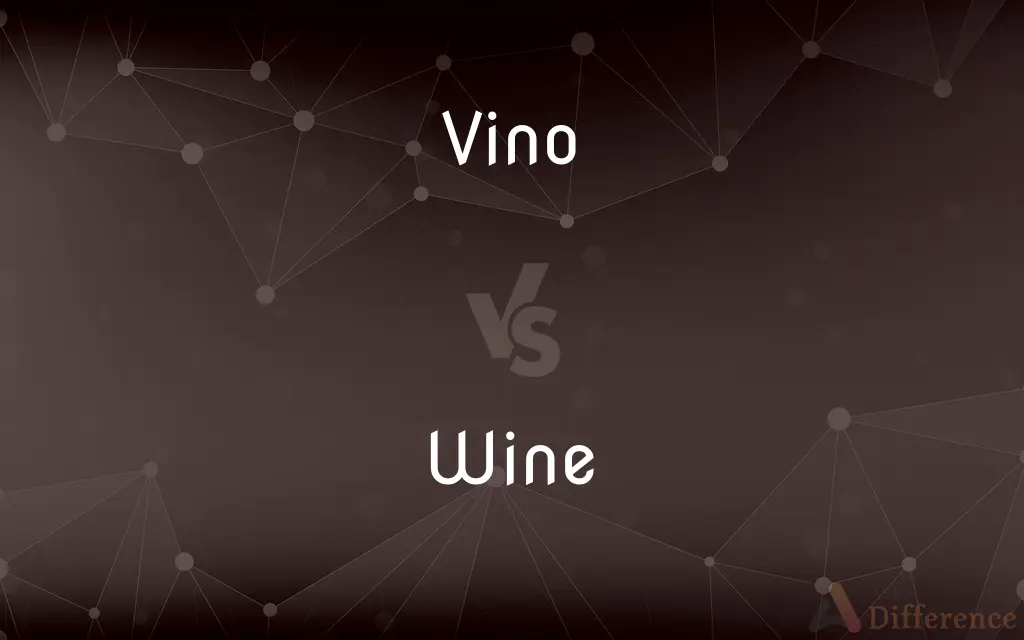Vino vs. Wine — What's the Difference?
By Tayyaba Rehman & Fiza Rafique — Updated on April 1, 2024
Vino is the Spanish and Italian word for wine, emphasizing its cultural roots, while wine is a broader term used globally, encompassing a vast range of fermented grape beverages.

Difference Between Vino and Wine
Table of Contents
ADVERTISEMENT
Key Differences
Vino refers specifically to wine in Spanish and Italian-speaking cultures, highlighting its importance and traditions in these regions. On the other hand, wine is a more encompassing term used internationally to describe the alcoholic beverage made from fermented grapes or other fruits.
While vino often evokes images of specific regional practices and types, such as those found in Spain, Italy, or Latin America, wine can refer to any variety from anywhere in the world, including regions outside of the traditional wine-producing areas.
Vino is typically used in contexts that emphasize the cultural and traditional aspects of wine production and consumption, particularly in countries where Spanish or Italian is spoken. Whereas, wine is used in a more general context, applicable to discussions about the beverage regardless of its origin or the cultural practices associated with it.
The terminology can also reflect the speaker's background or the linguistic context, with "vino" being preferred in settings where Spanish or Italian languages dominate. Wine, however, is the go-to term in English-speaking countries and in international discourse on the subject.
Despite these differences, both vino and wine share the same basic production process, involving the fermentation of grapes or sometimes other fruits. The distinction largely lies in cultural and linguistic usage rather than in the product itself.
ADVERTISEMENT
Comparison Chart
Language
Spanish and Italian
English
Cultural Connotation
Often associated with Spanish and Italian heritage and traditions
Broadly used with no specific cultural association
Usage
Predominantly in Spanish and Italian-speaking regions
Used globally
Types
May imply specific regional varieties within its cultural context
Encompasses all varieties, including those from non-traditional regions
Perception
Can evoke traditional and regional wine-making practices
Neutral, without specific cultural or traditional connotations
Compare with Definitions
Vino
A term used in Spanish and Italian to denote wine.
We enjoyed a bottle of vino with our pasta dinner.
Wine
Subject to extensive classification and regulation.
This wine has been aged in oak barrels for three years.
Vino
Often associated with traditional wine-producing regions.
The vino from Tuscany is renowned for its quality.
Wine
Encompasses a wide variety of types and origins.
The wine list includes options from around the world.
Vino
Used to emphasize the wine’s origin in casual conversation.
This vino is from the latest harvest in Spain.
Wine
Celebrated for its diversity and complexity.
Exploring different wine regions can be a fascinating journey.
Vino
Can imply a certain rustic or cultural charm.
The local vino was a perfect complement to the evening.
Wine
An alcoholic beverage made by fermenting grapes.
We opted for a red wine to accompany our meal.
Vino
Reflects the linguistic and cultural heritage of wine.
Our selection of vino caters to aficionados of Italian wines.
Wine
A key element in global culinary cultures.
Pairing wine with food enhances the dining experience.
Vino
Wine.
Wine
Wine is an alcoholic drink typically made from fermented grapes. Yeast consumes the sugar in the grapes and converts it to ethanol, carbon dioxide and heat.
Vino
(slang) Wine.
John came home drunk last night — he’d been at the vino again.
Wine
An alcoholic drink made from fermented grape juice
He opened a bottle of red wine
The regional foods and wines of France
Vino
Fermented juice (of grapes especially)
Wine
Entertain someone by offering them drinks and a meal
Members of Congress have been lavishly wined and dined by lobbyists for years
Wine
Dance with rhythmic gyratory movements of the pelvic region
The crowd jumped and wined and churned the field into mud
Wine
A beverage made of the fermented juice of any of various kinds of grapes, usually containing from 10 to 15 percent alcohol by volume.
Wine
A beverage made of the fermented juice of any of various other fruits or plants.
Wine
Something that intoxicates or exhilarates.
Wine
The color of red wine.
Wine
To provide or entertain with wine.
Wine
To drink wine.
Wine
An alcoholic beverage made by fermenting grape juice, with an ABV ranging from 5.5–16%.
Wine is usually stronger than beer.
"Wine improves with age but I improve with wine," she slurred as she slid gracefully beneath the table.
Wine
An alcoholic beverage made by fermenting other substances, producing a similar ABV.
...dandelion wine, rice wine, plum wine...
Wine
(countable) A serving of wine.
I'd like three beers and two wines, please. My friend will have the same.
Wine
(uncountable) The color of red wine, a deep reddish purple.
Wine
Wind.
Wine
(transitive) To entertain with wine.
Wine
(intransitive) To drink wine.
Wine
The expressed juice of grapes, esp. when fermented; a beverage or liquor prepared from grapes by squeezing out their juice, and (usually) allowing it to ferment.
Wine is a mocker, strong drink is raging, and whosoever is deceived thereby is not wise.
Bacchus, that first from out the purple grapeCrushed the sweet poison of misused wine.
Wine
A liquor or beverage prepared from the juice of any fruit or plant by a process similar to that for grape wine; as, currant wine; gooseberry wine; palm wine.
Wine
The effect of drinking wine in excess; intoxication.
Noah awoke from his wine.
Wine
Fermented juice (of grapes especially)
Wine
A red as dark as red wine
Wine
Drink wine
Wine
Treat to wine;
Our relatives in Italy wined and dined us for a week
Common Curiosities
What is vino?
Vino is the Spanish and Italian term for wine, often used within these linguistic and cultural contexts.
Can vino and wine be used interchangeably?
While they can be used interchangeably in bilingual contexts, vino usually indicates a cultural or regional specificity.
Do vino and wine taste different?
The taste depends on the grape and production method, not the term used to describe it.
Are there wines that cannot be called vino?
Technically, all wines could be called vino in the right linguistic context, but the term vino might not encompass wines from non-Spanish or non-Italian regions.
How does wine differ from vino?
Wine is the English term for the fermented grape beverage, whereas vino specifically refers to Spanish and Italian contexts.
Is vino cheaper than wine?
Price varies by brand, region, and quality rather than the term used.
Can I find vino in a regular wine shop?
Yes, wines from Spanish or Italian regions are commonly labeled as vino in appropriate markets.
What makes a wine internationally recognized as vino?
Recognition comes from linguistic usage rather than international standards.
Is the production process for vino different from wine?
The production process is essentially the same; the difference lies in linguistic and cultural contexts.
Are there specific occasions for drinking vino over wine?
Choice often depends on personal preference or cultural context rather than specific occasions.
Does the term vino imply a certain quality of wine?
Not necessarily; quality is independent of the term used and varies by producer and region.
Can I use the term wine when speaking in Spanish or Italian?
In Spanish or Italian, it's more appropriate to use vino, but wine might be understood in bilingual or English-speaking contexts.
How do I know if a wine is considered vino?
It's considered vino mainly in Spanish or Italian linguistic contexts.
Can non-grape beverages be called wine or vino?
While traditionally made from grapes, some fruit wines might be referred to using these terms, especially in casual contexts.
Is vino only made in Italy and Spain?
While vino refers to wine from any region in Spanish and Italian, it's most closely associated with these countries.
Share Your Discovery

Previous Comparison
Verify vs. Certify
Next Comparison
Husband vs. SpouseAuthor Spotlight
Written by
Tayyaba RehmanTayyaba Rehman is a distinguished writer, currently serving as a primary contributor to askdifference.com. As a researcher in semantics and etymology, Tayyaba's passion for the complexity of languages and their distinctions has found a perfect home on the platform. Tayyaba delves into the intricacies of language, distinguishing between commonly confused words and phrases, thereby providing clarity for readers worldwide.
Co-written by
Fiza RafiqueFiza Rafique is a skilled content writer at AskDifference.com, where she meticulously refines and enhances written pieces. Drawing from her vast editorial expertise, Fiza ensures clarity, accuracy, and precision in every article. Passionate about language, she continually seeks to elevate the quality of content for readers worldwide.














































